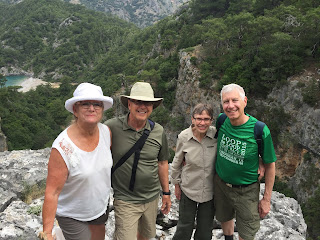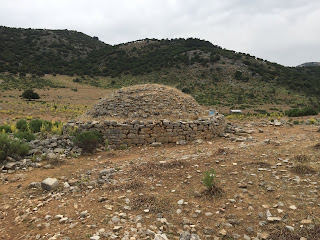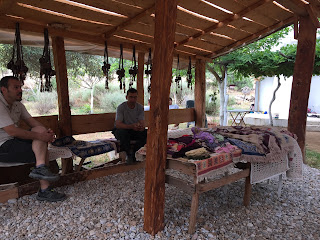Today our tour leader offered two hiking experiences in the Anatolian hills near the Aegean Sea. The first, in the morning, was alonger venture of about 2 miles over some fairly rough terrain.
Ersin, our tour leader, was personally excited about this one, but he was actively discouraging participation by some of those in the group for whom he thought it might be a bit too strenuous.
In the end, it was just Mark & Mary, accompanied by Ken and Kerry, a couple about our age from Texas. The dingy delivered us to shore, then the gullet got underway and moved around the peninsula to meet us in another bay, where we would end up.
The hike was as advertised — not so bad starting out, though it was up hill all the way. And rather challenging on the back side, with lots of loose rock and difficult footing coming down.
For our efforts, however, we had some spectacular views. We encountered the ruins of the ancient Roman city of Lidea, which have not been excavated. This gave us a good idea of what these sites look like before archaeologists arrive and restoration begins.
Along the way, we encountered a couple of cisterns, dug by shepherds to collect and store rain water. These probably dated back 100 years or more, but are still in use today.
We also visited a shepherd’s hut. It was clear that this shepherd is expecting visitors, as he has sort of a little shop set up to sell his wears — generally spoons he carves from olive wood, goat bells, and knitted items.
His wife served us a wonderful sage tea, and because Ersin had called ahead (even shepherds in the hills have cell phones nowadays), she had baked several loaves of bread for us to take back to the ship. It was still warm from the oven when she brought it out to us.
The gullet picked us up, and we discovered that those left behind had not been idle. As they sat at anchor, several “market boats” were making the rounds. These pull alongside and sell everything from ice cream to jewelry. They had done quite a business alongside our boat, and even more came by as we had lunch.
Our afternoon hike was shorter and on easier terrain, so in addition to the four morning hikers, three additional members of the group came along (2 others stayed on the boat all day).
A highlight of this hike was encountering a very small village. These folks were obviously not very prosperous, but there was a little mosque they had built (the nicest building in town). Other than the goats, however, there was nobody home. Every house was shut tight. Apparently they all have jobs elsewhere.
When the walking was done and we returned to the gullet, the captain had the sails raised, and we moved with the wind to our next destination. It was very pleasant to cruise along without engine noise, but after a bit, the wind died.
After “tea” but before dinner, Ersin insisted that we watch a video DVD he had about a 10th century BC temple site recently discovered in Anatolia. Although we won’t have a chance to visit, it is a very significant find that is changing understandings of the development of agriculture.
Unfortunately, the room was hot (windows had to be closed due to a thunder shower) and the movie was poorly done (and in Turkish with English subtitles). Most of the group fell asleep, and we finally had a “mutiny” where we all left before the movie was over.
The rain stopped and we ate dinner on deck, again followed by conversation before retiring.
Ersin, our tour leader, was personally excited about this one, but he was actively discouraging participation by some of those in the group for whom he thought it might be a bit too strenuous.
In the end, it was just Mark & Mary, accompanied by Ken and Kerry, a couple about our age from Texas. The dingy delivered us to shore, then the gullet got underway and moved around the peninsula to meet us in another bay, where we would end up.
The hike was as advertised — not so bad starting out, though it was up hill all the way. And rather challenging on the back side, with lots of loose rock and difficult footing coming down.
For our efforts, however, we had some spectacular views. We encountered the ruins of the ancient Roman city of Lidea, which have not been excavated. This gave us a good idea of what these sites look like before archaeologists arrive and restoration begins.
Along the way, we encountered a couple of cisterns, dug by shepherds to collect and store rain water. These probably dated back 100 years or more, but are still in use today.
We also visited a shepherd’s hut. It was clear that this shepherd is expecting visitors, as he has sort of a little shop set up to sell his wears — generally spoons he carves from olive wood, goat bells, and knitted items.
His wife served us a wonderful sage tea, and because Ersin had called ahead (even shepherds in the hills have cell phones nowadays), she had baked several loaves of bread for us to take back to the ship. It was still warm from the oven when she brought it out to us.
The gullet picked us up, and we discovered that those left behind had not been idle. As they sat at anchor, several “market boats” were making the rounds. These pull alongside and sell everything from ice cream to jewelry. They had done quite a business alongside our boat, and even more came by as we had lunch.
Our afternoon hike was shorter and on easier terrain, so in addition to the four morning hikers, three additional members of the group came along (2 others stayed on the boat all day).
A highlight of this hike was encountering a very small village. These folks were obviously not very prosperous, but there was a little mosque they had built (the nicest building in town). Other than the goats, however, there was nobody home. Every house was shut tight. Apparently they all have jobs elsewhere.
When the walking was done and we returned to the gullet, the captain had the sails raised, and we moved with the wind to our next destination. It was very pleasant to cruise along without engine noise, but after a bit, the wind died.
After “tea” but before dinner, Ersin insisted that we watch a video DVD he had about a 10th century BC temple site recently discovered in Anatolia. Although we won’t have a chance to visit, it is a very significant find that is changing understandings of the development of agriculture.
Unfortunately, the room was hot (windows had to be closed due to a thunder shower) and the movie was poorly done (and in Turkish with English subtitles). Most of the group fell asleep, and we finally had a “mutiny” where we all left before the movie was over.
The rain stopped and we ate dinner on deck, again followed by conversation before retiring.











No comments:
Post a Comment